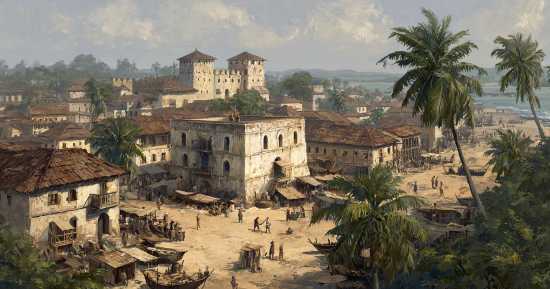
Woven with the rhythms of drumbeats and markets alive with color, the Ghana History Quiz opens a window to a nation that thrives on cultural pride and unity. Ghana’s story is told in its bustling festivals, where kente cloth glimmers in the sun, and in the welcoming spirit of its people who share their traditions with unmatched warmth. Its coastal towns, historic trade routes, and lively cities form a tapestry of progress and heritage. Through every street performance and handcrafted artifact, Ghana reveals a character that feels alive and deeply connected to its roots. This rich blend of past and present captures the essence of a country proud of its cultural heartbeat.
The achievements of Ghana stretch far beyond its borders. From the craftsmanship of goldsmiths to the artistry of traditional music, Ghanaian contributions continue to resonate around the world. Lively markets showcase not only goods but also the enduring connection between history and daily life. Dance, storytelling, and community gatherings serve as living archives of a shared identity passed down with care. This vibrant interplay between history and modernity reflects a nation that honors tradition while embracing progress with confidence.
This Ghana History Quiz reflects a place where history is not confined to books but celebrated through every festival, meal, and artisan’s creation. Whether in the intricate designs of kente weaving or the rich flavors of local dishes, Ghana’s cultural story remains dynamic and inspiring. Its landscapes and communities echo with resilience, creativity, and joy, reminding all who explore it that history here lives in the present. In every aspect of Ghanaian life, heritage continues to shape a future built on pride and cultural strength.
Festivals, Dance, And Cultural Identity
Ghana’s festivals overflow with color and community spirit. Events like Homowo and Aboakyer blend music, food, and ritual into experiences that unite families and entire towns. Drumming and dance form the pulse of these celebrations, connecting generations through movement and rhythm. Every festival becomes a living reflection of Ghana’s enduring cultural identity.
Traditional dance serves as both art and storytelling. From the graceful Adowa to the energetic Kete, each performance captures history in motion. Dancers pass down not only choreography but the meanings behind every gesture. These cultural expressions anchor Ghana’s communities in a shared sense of heritage.
Music amplifies this cultural heartbeat. From the resonant sounds of talking drums to the lyrical melodies of highlife, Ghana’s music blends tradition with innovation. These sounds fill marketplaces, festivals, and family gatherings alike, reminding everyone that history thrives in every note and step.
Craftsmanship, Food, And Everyday Traditions
Ghanaian craftsmanship remains a cornerstone of its heritage. Skilled artisans shape gold into intricate jewelry and weave kente cloth with striking precision. Each piece tells a story of heritage and pride that has endured for centuries. Their work is both a livelihood and a connection to ancestral wisdom.
Ghana’s food culture embodies history with every dish. Meals like fufu, banku, and jollof rice reflect regional traditions and deep cultural roots. Shared dining brings families and communities together, reinforcing the bonds between people and their past. Food is more than sustenance—it is history served on every plate.
Everyday traditions also shape Ghanaian identity. Market days brim with laughter, bargaining, and the sights of colorful stalls. These gatherings are not only commercial—they serve as cultural hubs where stories, customs, and connections are exchanged freely.
7 Serious Facts About Ghanaian History
- Kumasi served as the historic seat of the Ashanti Kingdom, known for its strong governance and trade networks.
- Ghana is home to over 80 indigenous languages, reflecting deep cultural diversity.
- Kente weaving originated with the Ashanti and Ewe people and remains an iconic cultural tradition.
- Many of Ghana’s festivals date back hundreds of years and remain central to community identity.
- The nation’s cultural heritage sites include ancient trade towns and historic craft centers.
- Ghana’s music and storytelling traditions play a crucial role in preserving historical knowledge.
- The symbolism of Adinkra reflects key philosophical and historical concepts passed through generations.
Art, Language, And Historical Continuity
Ghana’s art tells a story of heritage and transformation. From symbolic Adinkra patterns to bold contemporary creations, its artists merge history with innovation. These works speak of pride, identity, and a culture that values expression as a form of preservation. Through art, history remains visible and alive.
Language also holds a central role in Ghana’s past and present. Over 80 languages, including Akan and Ewe, reflect the diversity that enriches the nation’s character. Oral storytelling traditions preserve wisdom and teach values that remain relevant even today. This linguistic mosaic serves as a living archive of Ghana’s journey.
Historical continuity thrives in everyday life. Ceremonial rites, cultural education, and family traditions ensure that history is not only remembered but actively practiced. Ghana’s ability to blend the old with the new creates a cultural narrative that feels timeless and enduring.
7 Fun Facts About Ghanaian History
- Kente cloth patterns each carry unique symbolic meanings passed through generations.
- Ghana was the first sub-Saharan African country to celebrate Independence Day with nationwide festivals.
- Adinkra symbols are used in textiles, art, and architecture to express proverbs and historical values.
- The talking drum can imitate human speech to convey messages across distances.
- Homowo Festival literally translates to “hooting at hunger” and celebrates harvest abundance.
- Markets in Kumasi have operated continuously for centuries, serving as cultural meeting points.
- Highlife music blends African rhythms with Western instruments to create a distinctly Ghanaian sound.
Ghana History – FAQ
Ghana’s history continues to influence its current society in various ways. The legacy of colonization, the fight for independence,
